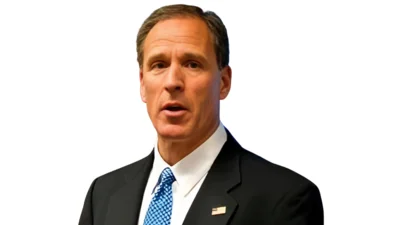A recent anti-violence march that shut down the Dan Ryan Expressway was the "right cause" but the "wrong target,” an urban affairs magazine declared.
The march on July 7 had the city’s mayor and the state's governor debating its merits on social media.
City Journal called the protest, led by the Rev. Michael Pfleger, senior pastor at The Faith Community of Saint Sabina, "misguided" and said the event blames "rampant violent crime on inadequate social spending" in a city in its eighth decade controlled by Democrats.

"Someone should be decrying Chicago's ongoing carnage, but Pfleger's explanation for what’s causing it — poverty, unemployment, and underfunded schools — is just another reprise of the old liberal notion that violent crime is driven by socioeconomic 'root causes'," Rafael Mangual, deputy director of legal policy at City Journal, said in an op-ed piece. "That argument reflects a serious misunderstanding of Chicago's highly concentrated violent crime."
City Journal is an urban affairs magazine published by the Manhattan Institute.
All five lanes of the expressway were shut down by thousands of protestors, who reportedly began their march a little after 10 a.m. Just before the march began, Gov. Bruce Rauner posted on his Twitter account that the protest was “unacceptable."
"We had clear parameters that allowed the protestors to be heard while respecting law and order," Rauner said. "Instead, they chose instead to cause chaos."
Rauner also took aim at Chicago's Mayor Rahm Emanuel, saying he was disappointed in the former chief-of-staff to President Obama. Calling on Emanuel to"take swift and decisive action to put an end to this kind of chaos."
In his own Twitter account, Emanuel retorted "It was a peaceful protest. Delete your account."
In a widely reported separate statement, a spokesman for Emanuel said the mayor’s "hope" is that the march "may make someone realize they shouldn't pick up a gun to settle a dispute, and if that happens the peaceful march the governor called 'chaos' will unquestionably be worth it."
Mangual, in his piece published before the protest began, said the protest's premise was deeply flawed.
"Violent crime is only loosely associated with socioeconomic factors like poverty, employment, and education spending," he said.
Mangual also pointed to criminologist Barry Latzer's The Rise and Fall of Violent Crime in America and a 2016 Chicago Tribune column that both made similar points well before Pfleger led the protest.
"Pfleger’s social-media posts blame the city’s crime problem on a lack of government spending for jobs and education," Mangual said. "The real problem is that Chicago consistently fails to incapacitate its criminal class; when the cops catch a bad guy, the city often lets him right out."
Spending even more on social programs "won't affect the crime rate when offenders get second, third, and fourth chances," Mangual said. "If Pfleger and his band of protesters are serious about addressing the senseless shootings claiming so many lives in Chicago, they should indeed demand more accountability — not from Chicago's social-welfare bureaucracy, but from the city's criminal class.”





 Alerts Sign-up
Alerts Sign-up